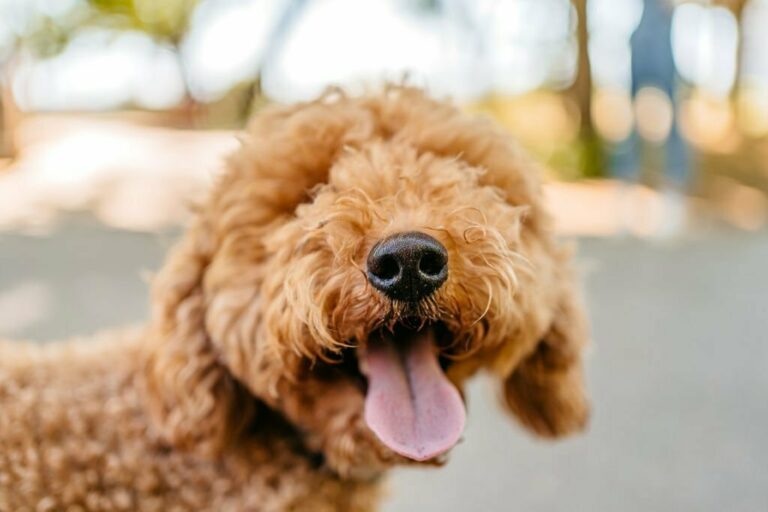History of the Goldendoodle Dog Breed
The Goldendoodle is a popular mixed breed, a fusion of the Goldendoodle and the Poodle. Known for their smartness, loving nature, and low-shedding coats, these dogs have become a favorite choice for families.
With charming coats that can be wavy, curly, or straight, Goldendoodles brings a unique variety to the doodle breed class. As large dogs, Goldendoodles are versatile and adapt splendidly to different homes, proving themselves great with kids and other animals.
A regimen of habitual exercise, consistent training, and frequent grooming is vital to keep a Goldendoodle, a large dog breed, healthy and happy. A balanced diet is essential for a new breed like the Goldendoodle to prevent any potential health conditions and maintain overall health.
Key Takeaways
- Goldendoodles combine Golden Retriever and Poodle traits.
- They are a guide dog, intelligent, affectionate, family-friendly, and have low-shed fur.
- Exercise, training, and grooming maintain their well-being.
Quick Facts
Goldendoodles are highly favored as family pets for several reasons. This crossbreed takes the best features from both its Poodle and Golden Retriever ancestors.
Their coat is a unique blend that combines the Poodle’s minimal-shedding fur, great for people with allergies, with the dense and water-resistant qualities of the Golden Retriever’s coat. They’re not just allergy-friendly; their personalities are also perfect for a family setting.
Goldendoodles inherit the labradoodle smarts and the Golden Retriever’s friendly demeanor, making them both easy to train and beautiful companions. These qualities also make them excellent for roles such as therapy and assistance dogs, solidifying their reputation as top family pets.
Goldendoodle Pictures
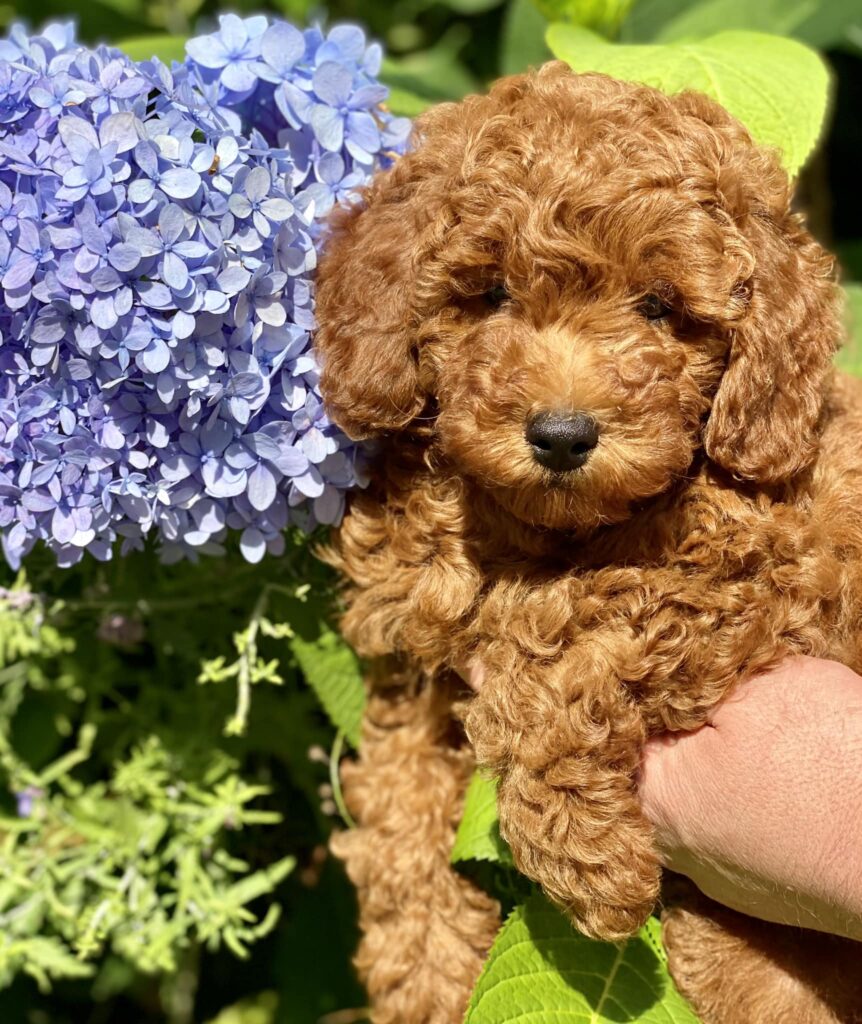

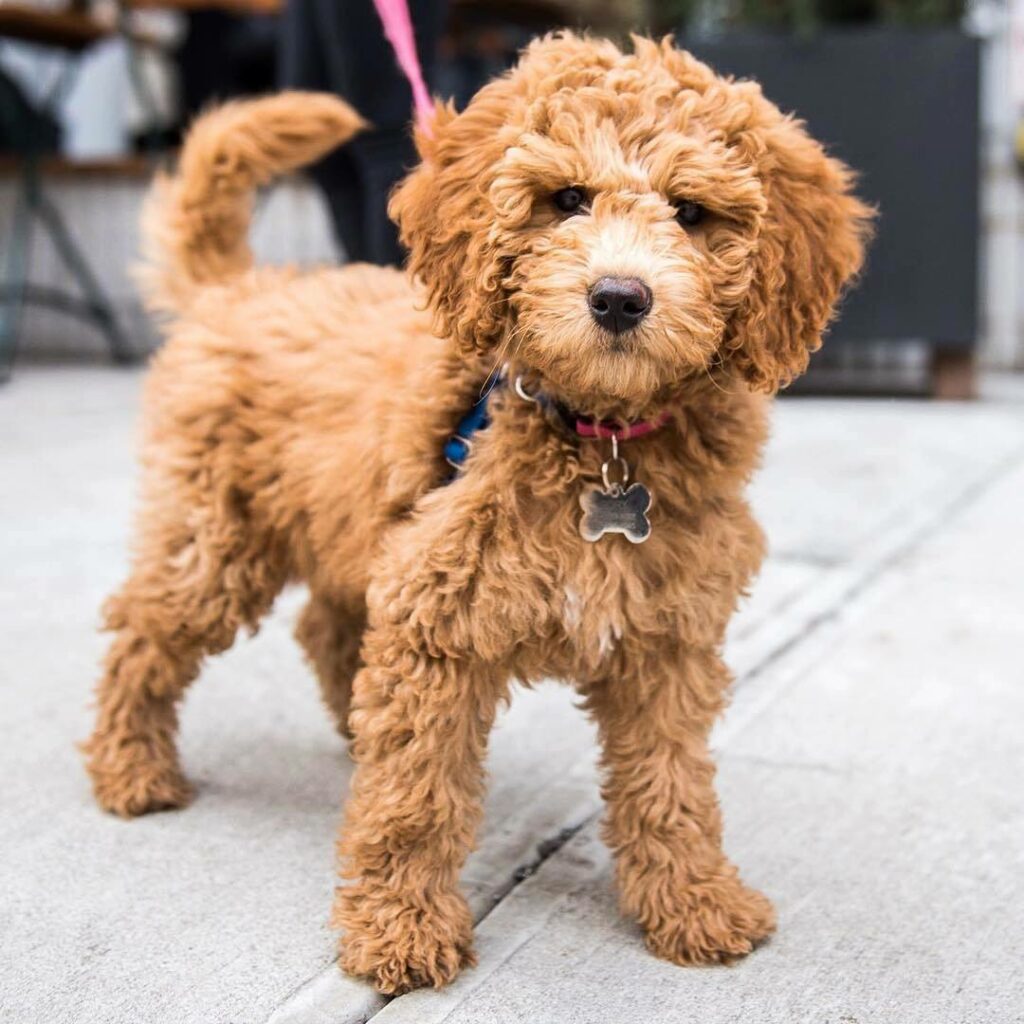



Overview
The Goldendoodle is a popular mixed breed, a cross between the low-shedding Poodle and the friendly Golden Retriever. This combination results in a dog that’s great for allergy sufferers and known for its warm temperament.
The size of a Goldendoodle can vary, taking after the Poodle parent, from a giant Standard Poodle to the more petite versions. These dogs generally live as long as the average for their parent breeds.
Their coats are typically low-shedding, thanks to the Poodle’s influence, making them a good match for people with allergies. Goldendoodles are often easy-going and get along well with other pets and children, inheriting the Golden Retriever’s friendly nature.
Breed Key Features
Goldendoodles come in various sizes, including toy, Miniature, and standard, making them a versatile fit for different living situations. Their coats, which may be wavy, curly, or straight, are known for being low-shedding and are often preferred by those with allergies due to their hypoallergenic qualities. Careful breeding is crucial to reduce the risk of common health issues like hip dysplasia and atopic dermatitis in Goldendoodles. Here’s a summary of Goldendoodle characteristics:
| Feature | Description |
|---|---|
| Size Categories | Toy, Miniature, Standard |
| Standard Goldendoodle | Needs more space, enjoys plenty of exercise |
| Miniature Goldendoodle | Ideal for smaller homes or apartments |
| Coat Types | Wavy, Curly, Straight |
| Health Concerns | Hip dysplasia, Seizures, Atopic dermatitis |
Understanding these details helps potential owners decide which Goldendoodle might be the best fit for their lifestyle and environment.
Breed Origin Development

The Goldendoodle is a thoughtfully crafted mix of the Golden Retriever and the Poodle, each breed bringing its qualities. When looking into the Goldendoodle’s background, it’s essential to consider how the Golden Retriever and Poodle contribute to the dog’s behavior, appearance, and health.
Understanding the benefits of mixed genetics, often hybrid vigor, is critical to recognizing the Goldendoodle’s improved health and energy levels. This breed has gained a lot of fans, thanks in part to its reputation for being allergy-friendly and a great addition to any family.
The Goldendoodle’s ability to learn quickly and adapt has made them excellent for various roles, from being a loving companion to serving as a dedicated service dog.
Ancestral Breed Contributions
To grasp the unique makeup of a Goldendoodle, it’s essential to look at the qualities passed down from its Golden Retriever and Poodle ancestors. The mix of these two breeds gives the Goldendoodle its characteristic low-shedding coat, which is excellent for allergy sufferers, and a friendly demeanor known to the Golden Retriever, making it a wonderful family pet.
These dogs often have coats that range in texture from soft waves to tight curls, depending on which parent’s genes are more dominant. Crossbreeding can also boost their health by reducing the risk of certain hereditary diseases often found in purebred dogs, which may increase the Goldendoodle’s overall health and longevity.
Hybrid Vigor Impacts
Hybrid vigor plays a crucial role in health improvements for the Goldendoodle, a crossbreed that merges the qualities of Golden Retrievers and Poodles. Careful breeding has reduced common genetic issues in these dogs, focusing on preventing inherited conditions like Von Willebrand disease and Progressive Retinal Atrophy.
Conscientious breeders aim to produce Goldendoodles with fewer health risks while preserving their intelligence and friendly nature. This approach not only boosts the well-being of the new generation but also retains their admired characteristics.
Historical Popularity Trends
In the 1990s, Goldendoodles emerged as a popular mixed breed due to intentional breeding in Australia and the United States. This new mix quickly gained a following in the U.S., becoming a sought-after pet for its friendly nature and low-shedding coats from its Poodle heritage.
Although leading dog organizations do not officially recognize them, Goldendoodles have become a beloved choice for families, especially during the recent pandemic when many sought the comfort of a pet. Their rise from a strategic breeding experiment to a cherished household name showcases the breed’s enduring appeal.
Dimension Range
Understanding the size range of Goldendoodles is vital for anyone looking to welcome someone into their home. The breed varies widely in size, mainly from their Poodle heritage.
Their weight can range from less than 30 pounds to well over 50 pounds, which plays a role in their overall health and diet plan. Knowing how tall they can grow is also essential, as it influences the amount of living space they’ll need and their exercise requirements.
Monitoring how quickly and for how long a Goldendoodle grows is vital for setting up the proper care and training schedule. Recognizing these standards helps properly assess and categorize Goldendoodles, ensuring they fit well with their potential families.
Size Variation
Goldendoodles come in various sizes, from the small Miniature that stands about 15 to 16 inches tall and weighs under 30 pounds to the enormous Standard variety that can reach 20 to 25 inches in height and tip the scales at 51 to 80 pounds.
The size of a Goldendoodle often depends on the Poodle parent’s size; mini Goldendoodles usually take after the Miniature Poodle, and medium ones are closer in size to the mid-sized Poodle. This diversity in size makes them suitable for different homes and lifestyles.
Breeders have intentionally bred Goldendoodles of various sizes to give future owners multiple options that fit their living spaces and daily routines.
Weight Spectrum
The Goldendoodle is a famous hybrid dog, a mix of the Golden Retriever and Poodle, and comes in various sizes to fit different home environments and lifestyles.
For those with ample space and enjoy active pastimes, the Standard Goldendoodle might be the ideal choice, usually weighing from 51 to 80 pounds and standing around 20 to 25 inches tall.
Live in a smaller space or prefer a more easily handled dog. The Miniature Goldendoodle might be perfect, typically weighing less than 30 pounds with a height of approximately 15 to 16 inches.
Those desiring an even smaller companion can opt for the Toy Goldendoodle, which offers all the breed’s delightful characteristics in a more manageable size.
This range of sizes means there’s a Goldendoodle that could be well-matched to most household needs.
Height Considerations
Choosing the right Goldendoodle size is essential to match the dog and its living environment.
A Standard Goldendoodle stands 20 to 25 inches tall, which is excellent for homes with lots of space for the dog to roam.
On the other hand, a Mini Goldendoodle is more minor, measuring 14 to 17 inches in height, making it a good fit for more compact homes or apartments.
The smallest, known as the Toy Goldendoodle, tops at 13 inches or less, perfect for those in apartments.
The size of the Poodle parent influences these sizes, and knowing them helps ensure your new pet will fit comfortably into your home and lifestyle.
Growth Patterns
Goldendoodles come in various sizes, much of which depends on the size of their Poodle ancestors.
A Standard Goldendoodle can grow to a hefty size, potentially tipping the scales at 100 pounds and standing over 21 inches tall. This size necessitates a living space that can accommodate their needs.
On the other hand, the smaller Miniature Goldendoodle won’t usually weigh more than 35 pounds and ranges in height from 14 to 17 inches.
The differing sizes of Goldendoodles mean their care must be adjusted to fit their physicality, including enough room to move and mental challenges to keep them sharp. Regular exercise is vital to prevent health issues and to support their well-being as they grow.
Breed Standard Measurements
Goldendoodles come in various sizes, a vital characteristic of the breed. The Standard Goldendoodle stands at least 21 inches tall and can weigh up to 100 pounds, while the smaller Miniature Goldendoodle typically measures between 14 and 17 inches in height and weighs no more than 35 pounds.
Their size differences originate from their heritage, being a mix of the Golden Retriever and the Poodle. The coat of a Goldendoodle, which they get from their Poodle ancestry, is known for being hypoallergenic and doesn’t shed much, but it does require regular grooming to keep it in good shape.
Breeders and dog owners should pay attention to these size and coat characteristics to maintain the dogs’ health and happiness. The size of a Goldendoodle can influence their risk for specific health issues prevalent in both parent breeds.
Temperament Traits
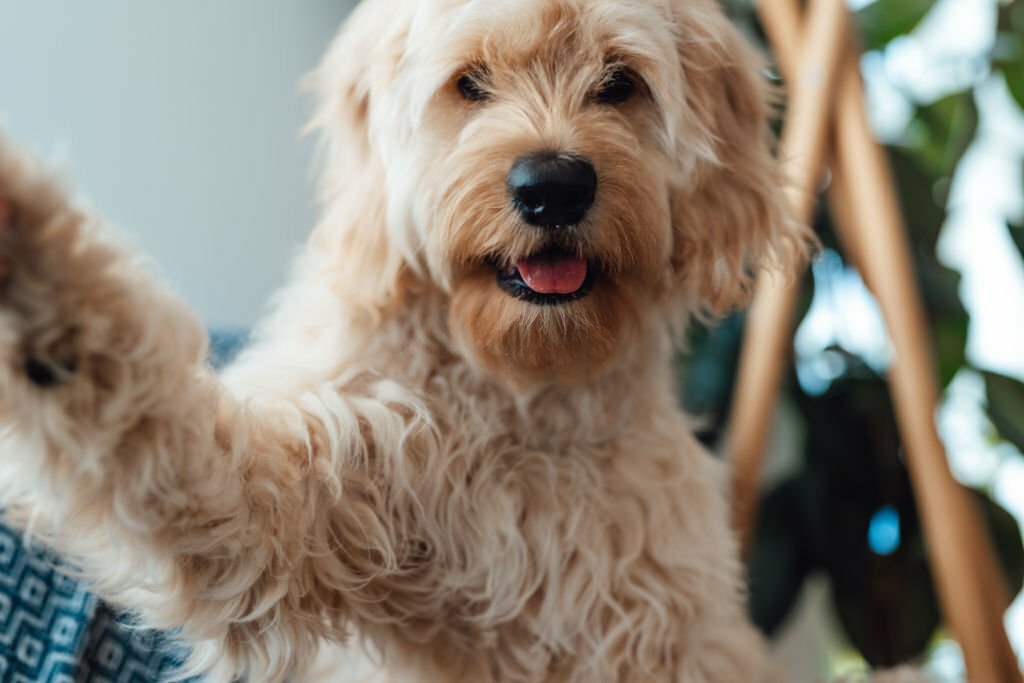
The Goldendoodle has a winning personality, making it great for families and a responsive partner in various activities. These dogs are known for their friendly nature, which makes them get along well with people and other pets.
They’re also quite intelligent, making them a breeze to train and capable of learning various tasks. Their zest for life means they need plenty of exercise and activities to keep their minds sharp.
It’s worth noting that individual Goldendoodles might have slight differences in their temperament, affecting how they adapt to new environments. Understanding these traits helps future owners decide whether a Goldendoodle fits their home and lifestyle well.
Friendly and Social
Goldendoodles are well-loved for their friendly personalities and ability to blend seamlessly into family life, making friends with humans and other animals. Their gentle approach and tolerance make them particularly good around young children. These dogs are quick learners and respond well to training, showing high obedience and a knack for picking up tricks without being prone to unnecessary barking.
These dogs thrive in homes with other pets due to their peaceful nature and are known for getting along well with everyone. Goldendoodles can adapt to various living spaces, from small apartments to spacious houses, as long as they get their daily dose of exercise and mental challenges to keep them engaged and content.
Intelligent and Trainable
Goldendoodles shine with their friendly disposition, but their sharp minds and ease of training make them stand out. Known for their quick learning and adaptability, they excel in picking up new commands and responding to various training methods. They thrive with consistent, well-structured training sessions that constructively tap into their mental capabilities.
Rewarding good behavior is critical, bolsters the learning process, and encourages them to continue improving. Introducing them to different people and environments is vital early on. This helps maintain their natural friendliness and prevents negative behaviors from taking root.
Owners looking for a pet that is both a joy to teach and eager to learn will find Goldendoodles a perfect match.
Energetic Playful Nature
Known for their intelligence and ease of training, Goldendoodles are full of energy and love to play, making them perfect pets for families and individual owners. They need daily exercise like walks and games of fetch to stay happy and healthy. Their zest for life comes from their parent breeds, making them ideal for active people.
Regularly scheduling activities such as agility training can keep a Goldendoodle both physically fit and mentally sharp. This thoughtful approach to their exercise plan taps into their physical strengths and ensures their friendly nature remains well-balanced, making them especially good around kids.
Good With Kids
Goldendoodles are known for their friendly and playful nature, making them good companions for kids. They inherit their kind disposition from Golden Retrievers and Poodles, allowing them to fit nicely into homes with children. Observations show Goldendoodles are careful and nurturing around young ones, much like a watchful guardian.
Their smarts and ease of training mean they can learn to behave well, keeping a household with kids safe and happy. These qualities make it clear why Goldendoodles are often considered the perfect family dog.
Mild Temperament Variation
Goldendoodles are known for being friendly, intelligent, and obedient, but these traits can differ a little based on their heritage and upbringing. They usually get their easy-going nature from Golden Retrievers, along with the smarts and ease of training seen in Poodles. These qualities can show slight variations due to the unique genetic combinations and the dog’s upbringing.
Giving your Goldendoodle plenty of interaction and exposure to different situations early on is critical to cultivating a balanced personality. Knowing these subtle differences helps future owners meet their needs and better understand their Goldendoodle pets’ behaviors.
Common Health Concerns
When discussing health concerns for Goldendoodles, it’s vital to be aware of the genetic risks and the steps you can take to prevent them.
Goldendoodles can inherit conditions like hip dysplasia and atopic dermatitis, so monitoring symptoms is critical.
Scheduling regular visits to the vet plays a massive role in catching and managing any health problems early. It’s also wise to practice preventative care to minimize the chances of diseases.
Taking steps to understand and reduce the impact of hereditary issues such as von Willebrand’s disease will help ensure your Goldendoodle has a healthy and happy life.
Genetic Disease Risk
Goldendoodles, a mix of Golden Retrievers and Poodles, often face health challenges passed down from their parents. One key issue they might inherit is Hip Dysplasia, an abnormal hip joint formation that can lead to discomfort and mobility problems.
Another serious condition is Progressive Retinal Atrophy (PRA), a genetic eye disorder that gradually leads to blindness and affects both parent breeds.
To understand and prevent these health problems, it’s essential to closely examine the health history of the Golden Retriever and the Poodle. Ethical breeding practices are vital, including thorough health checks for both breeds before mating. This proactive approach helps reduce the risk of passing such conditions to Goldendoodle puppies.
Regular Veterinary Check-ups
Goldendoodles need regular vet check-ups due to their risk of specific health issues. These friendly dogs may be prone to problems like skin allergies, hip problems, and bleeding disorders. Taking them for routine health evaluations can catch these issues early, which is critical to managing them effectively. Goldendoodles can also suffer from knee ligament injuries, so keeping an eye on their exercise and weight is vital.
During a vet visit, your dog’s health screening will likely include checks for seizures, knee dislocations, and ear infections. Veterinary technology has advanced, giving vets better tools to prevent and treat these conditions, improving your Goldendoodle’s chances for a healthy life.
Preventative Health Measures
After routine vet visits, taking extra steps to keep your Goldendoodle healthy is vital. Watch out for health issues like hip dysplasia, eye problems, and a blood disorder called von Willebrand disease.
Regular grooming is vital to prevent skin problems and keep their coat in good shape, which helps avoid allergies. Cleaning your dog’s ears consistently can also reduce the chance of ear infections, which Goldendoodles are prone to.
Don’t forget their mental health; consistent daily routines and brain games can help stave off separation anxiety.
These actions are part of a thorough plan to ensure your Goldendoodle stays healthy for as long as possible.
Maintenance & Grooming
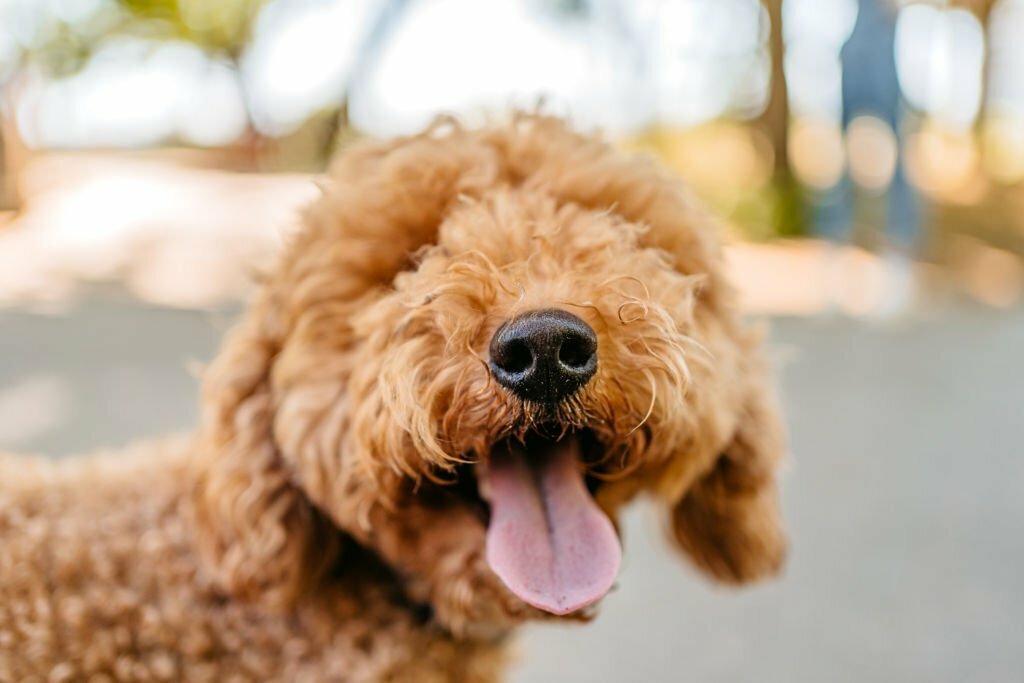
Caring for your Goldendoodle’s coat is essential for their overall health. A consistent grooming schedule helps control shedding and keeps their fur mat-free. Brush your Goldendoodle several times weekly using the right tools, like slicker brushes and combs. Clippers can also be handy for trimming their coat to a manageable length.
Regular visits to a professional groomer, about every six to eight weeks, are recommended for a complete and precise haircut. Invest in high-quality shampoos and conditioners to support the health of your Goldendoodle’s skin and fur. This will help maintain the natural oils in their coat and prevent dryness or irritation.
Brushing Frequency
Goldendoodles must be brushed daily to keep their coats healthy and prevent mats, especially for those with curl hair. Their coat is a mix of the Poodle’s curls and the Golden Retriever’s straighter hair, which means they need special attention when grooming. To keep their fur smooth and debris-free, using the right tools, like a slicker brush or a comb, is essential. Doing this carefully every day helps prevent mats.
It’s also a good idea to take your Goldendoodle to a professional groomer every 6 to 8 weeks. This helps keep their coat in excellent condition and makes daily brushing easier.
Shedding Levels
Goldendoodles have won hearts for shedding less, but they need regular grooming to keep their allergy-friendly coat in top condition.
While Goldendoodles inherit a curly coat from their Poodle lineage that typically sheds less, they’re not entirely free of allergens. Their thick and curly hair requires careful attention to avoid tangles and remove any dead hair.
Brushing daily is crucial to maintain their coat’s health and prevent skin problems.
It’s also advisable to have a professional groomer take care of their coat every 6 to 8 weeks, ensuring both cleanliness and style.
Grooming Tools Needed
Having the right grooming tools is a must to keep your Goldendoodle looking great and feeling comfortable.
Slicker brushes and detangling combs are perfect for preventing mats in their curly coats, and they work wonders on straight coats to reduce shedding and keep the fur smooth.
High-quality grooming shears are necessary for precise cuts and styling, especially around delicate areas like the face and paws.
To avoid ear infections, which Goldendoodles can be prone to because of their floppy ears, use ear cleaning solutions and cotton balls in your grooming kit every couple of weeks.
And don’t forget about professional-grade clippers and trimmers for the regular grooming sessions, ideally, every 6-8 weeks, to maintain a healthy and manageable coat.
Professional Grooming Intervals
Regular visits to a professional groomer every six to eight weeks are vital for keeping a Goldendoodle’s coat healthy and looking great. Known for their low shedding, Goldendoodles need consistent grooming to avoid tangles and keep their skin free from irritation. These dogs, with their Poodle heritage, often have a curlier coat that demands careful and regular maintenance.
Regular grooming sessions help to remove dirt and prevent skin problems, playing a significant role in the overall health of these popular pets. Staying on top of grooming keeps your Goldendoodle comfortable and makes managing their unique coat much more accessible.
Coat Health Tips
To keep your Goldendoodle’s coat in top shape, brush it daily. Their coats vary, yet all types need attention to avoid knots and mats.
Because they don’t shed much and are often seen as less likely to cause allergies, it’s vital to groom them regularly to keep their fur looking its best. Using the proper grooming tools and feeding your dog a diet rich in omega fatty acids can lead to a lustrous and vibrant coat.
Always check their skin and coat for any signs of trouble during grooming sessions, and act quickly if you find anything concerning. Such dedication to grooming not only keeps your dog looking great but also supports their overall health.
Dietary Requirements

When planning meals for Goldendoodles, choosing the right food that meets their unique needs is vital. Establish a regular feeding routine to help maintain their digestion and keep their energy levels stable.
A well-rounded diet is crucial in supporting their growth and active lifestyle. Personalize their meals based on each dog’s health to prevent common issues. Smart nutrition choices will help your Goldendoodle thrive for years to come.
Appropriate Food Types
Proper nutrition is vital to keeping Goldendoodles healthy and full of energy. They’re an active breed that thrives on plenty of exercise, often at their favorite spot, the dog park.
Their diet should reflect their size, age, and unique metabolism, with the right mix of proteins, carbs, fats, vitamins, and minerals.
Each Goldendoodle has its own nutritional needs, but generally, they do well on high-quality food designed for their breed. This type of food helps maintain their hypoallergenic coat and reduces health issues.
Consistently checking their diet with your vet’s guidance ensures they stay fit and happy.
Feeding Schedules
Creating a consistent feeding routine is essential for a Goldendoodle’s health. It ensures they get the right balance of nutrients and can lead to a longer, healthier life. To determine how much food your dog needs, you should look at their size, age, body shape, metabolism, and activity.
Each Goldendoodle has unique dietary needs, and setting a regular meal schedule with controlled portions can prevent obesity.
Owners should provide a diet that supports their dog’s energy levels, especially since Goldendoodles typically need about a 30-minute workout and enjoy being social every day. A well-planned diet and feeding schedule can improve your pet’s quality of life and help avoid health problems related to poor nutrition.
Nutritional Needs Balance
Nutrition is vital for a Goldendoodle’s health, considering their energy levels and zest for life. When planning their meals, it’s essential to consider the dog’s size, age, build, metabolism, and how active they are. Doing so makes sure they get exactly what they need for their well-being.
A well-rounded diet for a Goldendoodle should include the right mix of proteins, fats, carbs, vitamins, and minerals. Choosing the right foods can help prevent health problems like hip dysplasia and atopic dermatitis, which Goldendoodles might be prone to.
Regular check-ups with the vet can help tailor their diet even better, supporting a long and happy life for your pet.
Additional Information
Origins of the Goldendoodle
The Goldendoodle breed originated in North America during the 1990s as a response to the demand for hypoallergenic guides and service dogs. Breeders aimed to create a dog with the intelligence and low-shedding coat of the Poodle, combined with the gentle and obedient nature of the Golden Retriever. The outcome was the lovable Goldendoodle.
Characteristics of the Goldendoodle Breed
Goldendoodles are known for their curly or wavy coats, which come in shades of gold, cream, and apricot. They typically have an affectionate and highly social temperament, making them a favorite choice for families and individuals looking for a new pet.
Why are Goldendoodles popular?
Goldendoodles have gained popularity due to their hypoallergenic coat, making them suitable for individuals with allergies. Additionally, their intelligence and eagerness to please make them highly trainable, whether for dog sports, therapy work, or simply as a loving family companion.
How to Groom a Goldendoodle
Grooming a Goldendoodle is essential to their care routine, considering their unique coat type and tendencies. Understanding their coat type and following proper grooming practices can ensure a healthy and happy Goldendoodle.
Understanding the Goldendoodle’s Coat Type
Goldendoodles can have different coat types, including curly, wavy, or straight. Their coat may vary in texture and length, requiring specific grooming techniques based on these variations. Pet parents must understand their Goldendoodle’s coat type to provide adequate grooming care.
Tips for Grooming a Goldendoodle
Regular brushing is essential to prevent matting and tangling, especially for Goldendoodles with longer, wavy coats. Bathing should be done as needed, using a gentle dog shampoo to maintain the coat’s natural oils. Additionally, keeping their ears clean and nails trimmed is crucial for their overall well-being.
Professional Grooming vs. DIY Grooming
While some Goldendoodle owners prefer professional grooming services, others opt for DIY grooming at home. Professional groomers are equipped to manage the breed’s coat, providing professional trims and grooming. However, pet parents can also learn to groom their Goldendoodle at home by following expert guidance and using the right tools.
Getting a Goldendoodle: What You Need to Know
Before bringing a Goldendoodle home, there are essential considerations to ensure a smooth transition for the dog and the family. From selecting a responsible breeder to preparing the home environment, being well-informed is crucial when welcoming a new furry family member.
Choosing a Reputable Goldendoodle Breeder
When getting a Goldendoodle, choosing a reputable breeder who prioritizes responsible breeding practices and puppies’ health is essential. Conducting thorough research, visiting the breeder’s facilities, and asking pertinent questions can help identify a reliable source for obtaining a Goldendoodle.
Understanding Potential Health Conditions in Goldendoodles
Goldendoodles can be prone to certain health conditions like any dog breed, including hip dysplasia and certain genetic diseases. Understanding these potential health issues can enable pet parents to take proactive measures and provide proper healthcare for their Goldendoodle.
Preparing Your Home for a Goldendoodle
Creating a safe and welcoming environment for a Goldendoodle is essential. This includes puppy-proofing the home, setting up a comfortable sleeping area, and ensuring the availability of necessary supplies such as food, water, toys, and grooming tools.
Goldendoodle as a Family Pet: What to Expect
Goldendoodles are known for their affectionate nature and playful demeanor, making them an excellent choice as a family companion. However, it’s essential to understand their needs and behaviors to ensure a harmonious relationship with the new furry family member.
The Affectionate and Playful Nature of Goldendoodles
Goldendoodles are highly social dogs that thrive on human interaction and affection. They are often known for their loving and gentle demeanor, making them great companions for individuals and families.
Separation Anxiety in Goldendoodles
Due to their attachment to the family, Goldendoodles may experience separation anxiety when left alone for extended periods. Pet parents must gradually accustom their Goldendoodle to alone time and provide stimulating activities to alleviate stress.
Training and Socialization for Goldendoodles
Proper training and socialization are crucial for Goldendoodles, starting from puppyhood. Positive reinforcement training can help shape their behavior, making them well-adjusted and obedient pets. Regular socialization with other dogs and exposure to different environments also benefit their well-being.
Critical Characteristics of Goldendoodles: A Breed Profile
Goldendoodles exhibit a unique blend of traits inherited from their parent breeds, contributing to their overall appeal as companion animals. Understanding their genetic makeup and comparing them with other designer breeds can provide valuable insights into the distinct characteristics of Goldendoodles.
Understanding the Genetic Makeup of Goldendoodles
As a crossbreed of the Poodle and the Golden Retriever, Goldendoodles inherit a diverse mix of traits from their parent breeds. This includes their coat type, size, temperament, and intelligence, resulting in a versatile and lovable companion.
Comparing Goldendoodles with Other Best Dog or New Dog
Given their shared Poodle parentage, Goldendoodles are often compared with other designer breeds, such as Labradoodles. Understanding the similarities and differences between these breeds can assist individuals in deciding which dog breed best aligns with their lifestyle and preferences.
Goldendoodles: A Crossbreed of Poodle and Golden Retriever
Goldendoodles are a successful crossbreed known for their intelligence, friendly disposition, and hypoallergenic coat. Their popularity continues to grow, appealing to individuals seeking an active and affectionate companion.

